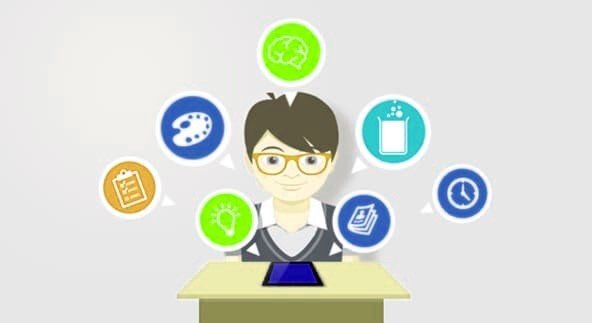
In today’s fast-paced world, where technology is advancing at an unprecedented rate, eLearning has gained immense popularity as a convenient and effective way to acquire knowledge and skills. With the rise of mobile devices and the increasing demand for flexible learning options, eLearning app development has become a key focus for educational institutions and businesses alike. This article explores the latest trends in eLearning app development, highlighting the advancements that are shaping the future of online learning.
In recent years, eLearning app development has undergone significant transformations to enhance user engagement, interactivity, and overall learning outcomes. Developers are incorporating cutting-edge technologies and innovative features to deliver a seamless learning experience to users across different platforms and devices.
Mobile-First Approach
With the widespread use of smartphones and tablets, eLearning apps are now being developed with a mobile-first approach. These apps are designed to be responsive and optimized for smaller screens, providing learners with the flexibility to access educational content anytime, anywhere.
Personalized Learning Experience
Personalization is a key trend in eLearning app development. By leveraging user data, such as preferences, learning styles, and progress, developers can create personalized learning paths and recommendations. This tailored approach enhances learner engagement and motivation, leading to better retention of knowledge.

Gamification and Interactive Elements
Gamification techniques, such as rewards, badges, and leaderboards, are being integrated into eLearning apps to make the learning experience more engaging and enjoyable. Interactive elements, such as quizzes, simulations, and interactive videos, further enhance learner interactivity and promote active participation.
Virtual Reality (VR) and Augmented Reality (AR) Integration
Virtual Reality (VR) and Augmented Reality (AR) technologies are revolutionizing eLearning by providing immersive and realistic learning experiences. These technologies enable learners to explore virtual environments, interact with objects, and simulate real-world scenarios, enhancing knowledge retention and skill development.
Artificial Intelligence (AI) and Machine Learning (ML) Integration
The integration of Artificial Intelligence (AI) and Machine Learning (ML) in eLearning apps has opened new possibilities for adaptive learning and intelligent content delivery. AI-powered algorithms can analyze learner behavior, identify knowledge gaps, and provide personalized feedback and recommendations, creating a truly customized learning experience.
Microlearning and Bite-Sized Content
eLearning App development, which involves delivering content in small, bite-sized modules, is gaining popularity in eLearning. Learners can access short lessons or modules that focus on specific topics, making learning more manageable and allowing for greater flexibility in scheduling study sessions.

Social Learning and Collaboration Features
eLearning apps are incorporating social learning and collaboration features to promote peer-to-peer interaction and knowledge sharing. Features such as discussion forums, chat functionalities, and collaborative projects enable learners to engage with their peers, share ideas, and learn from each other’s experiences.
Adaptive Assessments and Learning Analytics
Adaptive assessments are being implemented in eLearning apps to provide learners with personalized quizzes and tests based on their individual learning progress. Learning analytics tools gather data on learner performance, engagement, and behavior, allowing educators to track progress, identify areas of improvement, and tailor instruction accordingly.
Offline Access and Progressive Web Apps (PWAs)
To overcome connectivity limitations, eLearning apps are now offering offline access to educational content. Progressive Web Apps (PWAs) enable learners to download course materials and access them offline, ensuring uninterrupted learning experiences even in low or no internet connectivity areas.
User-Friendly Interface and Navigation
Simplicity and user-friendliness are essential factors in eLearning app development. Intuitive interfaces, clear navigation, and easy-to-use features enhance the overall user experience, making it effortless for learners to navigate through the app and access the desired content.
Accessibility and Inclusivity
Ensuring accessibility and inclusivity is a significant focus in modern eLearning app development. Developers are incorporating features such as screen readers, closed captions, and alternative text descriptions to make educational content accessible to learners with disabilities, ensuring equal learning opportunities for all.

Security and Data Privacy
As eLearning involves the collection and storage of user data, ensuring security and data privacy is paramount. Developers are implementing robust security measures, such as encryption, secure authentication, and regular data backups, to protect sensitive learner information from unauthorized access or breaches.
Cloud-Based Infrastructure
Cloud-based infrastructure is becoming increasingly popular in what are the latest Trends for eLearning mobile App Development company 2023. Cloud hosting enables seamless scalability, efficient content delivery, and easy updates, ensuring a smooth learning experience for users even during peak usage periods.

Conclusion
The eLearning industry is evolving rapidly, and app developers are at the forefront of innovation in this field. By incorporating the latest trends such as a mobile-first approach, personalized learning experiences, gamification, VR/AR integration, AI/ML capabilities, and other advanced features, eLearning apps are revolutionizing the way we acquire knowledge and skills. As technology continues to advance, we can expect even more exciting developments in eLearning app development, empowering learners worldwide.
Read More: The Role of Machine Learning in Predictive Analytics 2023
FAQs eLearning App Development
How can eLearning apps provide a personalized learning experience?
eLearning apps can provide personalized learning experiences by leveraging user data, analyzing learner preferences, and offering tailored content recommendations based on individual needs.
What is microlearning, and why is it gaining popularity?
Microlearning involves delivering content in small, bite-sized modules. It is gaining popularity as it allows learners to access specific topics quickly, making learning more manageable and flexible.
How do gamification and interactive elements enhance eLearning?
Gamification and interactive elements make eLearning engaging and enjoyable. They promote learner interactivity, motivation, and active participation, leading to better retention of knowledge.
What are the benefits of integrating VR and AR in eLearning apps?
Integrating VR and AR in eLearning apps provides immersive and realistic learning experiences. Learners can explore virtual environments, interact with objects, and simulate real-world scenarios, enhancing knowledge retention and skill development.
How do AI and ML enhance eLearning apps?
AI and ML enhance eLearning apps by providing adaptive learning, intelligent content delivery, and personalized feedback. They analyze learner behavior, identify knowledge gaps, and offer customized learning experiences.
Read More: How Much Does it Cost to Develop a Travel App Like Hopper 2023 Cost Estimation







